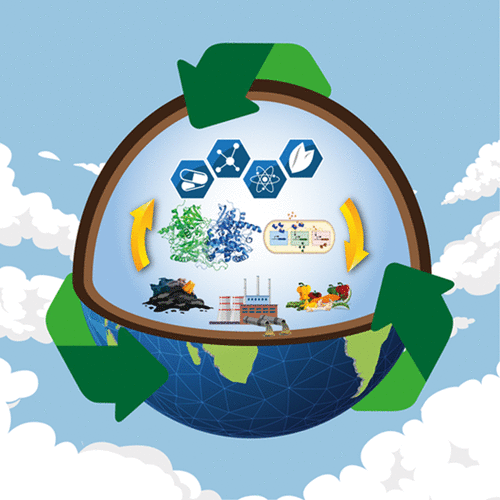当前位置:
X-MOL 学术
›
Chem. Rev.
›
论文详情
Our official English website, www.x-mol.net, welcomes your
feedback! (Note: you will need to create a separate account there.)
Enzymes, In Vivo Biocatalysis, and Metabolic Engineering for Enabling a Circular Economy and Sustainability
Chemical Reviews ( IF 51.4 ) Pub Date : 2021-07-06 , DOI: 10.1021/acs.chemrev.1c00121 Pattarawan Intasian 1 , Kridsadakorn Prakinee 1 , Aisaraphon Phintha 1, 2 , Duangthip Trisrivirat 1 , Nopphon Weeranoppanant 1, 3 , Thanyaporn Wongnate 1 , Pimchai Chaiyen 1
Chemical Reviews ( IF 51.4 ) Pub Date : 2021-07-06 , DOI: 10.1021/acs.chemrev.1c00121 Pattarawan Intasian 1 , Kridsadakorn Prakinee 1 , Aisaraphon Phintha 1, 2 , Duangthip Trisrivirat 1 , Nopphon Weeranoppanant 1, 3 , Thanyaporn Wongnate 1 , Pimchai Chaiyen 1
Affiliation

|
Since the industrial revolution, the rapid growth and development of global industries have depended largely upon the utilization of coal-derived chemicals, and more recently, the utilization of petroleum-based chemicals. These developments have followed a linear economy model (produce, consume, and dispose). As the world is facing a serious threat from the climate change crisis, a more sustainable solution for manufacturing, i.e., circular economy in which waste from the same or different industries can be used as feedstocks or resources for production offers an attractive industrial/business model. In nature, biological systems, i.e., microorganisms routinely use their enzymes and metabolic pathways to convert organic and inorganic wastes to synthesize biochemicals and energy required for their growth. Therefore, an understanding of how selected enzymes convert biobased feedstocks into special (bio)chemicals serves as an important basis from which to build on for applications in biocatalysis, metabolic engineering, and synthetic biology to enable biobased processes that are greener and cleaner for the environment. This review article highlights the current state of knowledge regarding the enzymatic reactions used in converting biobased wastes (lignocellulosic biomass, sugar, phenolic acid, triglyceride, fatty acid, and glycerol) and greenhouse gases (CO2 and CH4) into value-added products and discusses the current progress made in their metabolic engineering. The commercial aspects and life cycle assessment of products from enzymatic and metabolic engineering are also discussed. Continued development in the field of metabolic engineering would offer diversified solutions which are sustainable and renewable for manufacturing valuable chemicals.
中文翻译:

用于实现循环经济和可持续性的酶、体内生物催化和代谢工程
自工业革命以来,全球工业的快速增长和发展在很大程度上依赖于煤衍生化学品的利用,以及最近石油基化学品的利用。这些发展遵循线性经济模型(生产、消费和处置)。由于世界正面临气候变化危机的严重威胁,更可持续的制造业解决方案,即循环经济,其中来自相同或不同行业的废物可以用作生产原料或资源,提供有吸引力的工业/商业模式. 在自然界中,生物系统,即微生物通常使用它们的酶和代谢途径来转化有机和无机废物,以合成它们生长所需的生化物质和能量。所以,了解选定的酶如何将生物基原料转化为特殊(生物)化学品,这是在生物催化、代谢工程和合成生物学中应用的重要基础,以使生物基过程对环境更环保、更清洁。这篇评论文章重点介绍了关于用于转化生物基废物(木质纤维素生物质、糖、酚酸、甘油三酯、脂肪酸和甘油)和温室气体(CO2和 CH 4 ) 转化为增值产品,并讨论了其代谢工程的当前进展。还讨论了酶和代谢工程产品的商业方面和生命周期评估。代谢工程领域的持续发展将为制造有价值的化学品提供可持续和可再生的多样化解决方案。
更新日期:2021-09-08
中文翻译:

用于实现循环经济和可持续性的酶、体内生物催化和代谢工程
自工业革命以来,全球工业的快速增长和发展在很大程度上依赖于煤衍生化学品的利用,以及最近石油基化学品的利用。这些发展遵循线性经济模型(生产、消费和处置)。由于世界正面临气候变化危机的严重威胁,更可持续的制造业解决方案,即循环经济,其中来自相同或不同行业的废物可以用作生产原料或资源,提供有吸引力的工业/商业模式. 在自然界中,生物系统,即微生物通常使用它们的酶和代谢途径来转化有机和无机废物,以合成它们生长所需的生化物质和能量。所以,了解选定的酶如何将生物基原料转化为特殊(生物)化学品,这是在生物催化、代谢工程和合成生物学中应用的重要基础,以使生物基过程对环境更环保、更清洁。这篇评论文章重点介绍了关于用于转化生物基废物(木质纤维素生物质、糖、酚酸、甘油三酯、脂肪酸和甘油)和温室气体(CO2和 CH 4 ) 转化为增值产品,并讨论了其代谢工程的当前进展。还讨论了酶和代谢工程产品的商业方面和生命周期评估。代谢工程领域的持续发展将为制造有价值的化学品提供可持续和可再生的多样化解决方案。










































 京公网安备 11010802027423号
京公网安备 11010802027423号